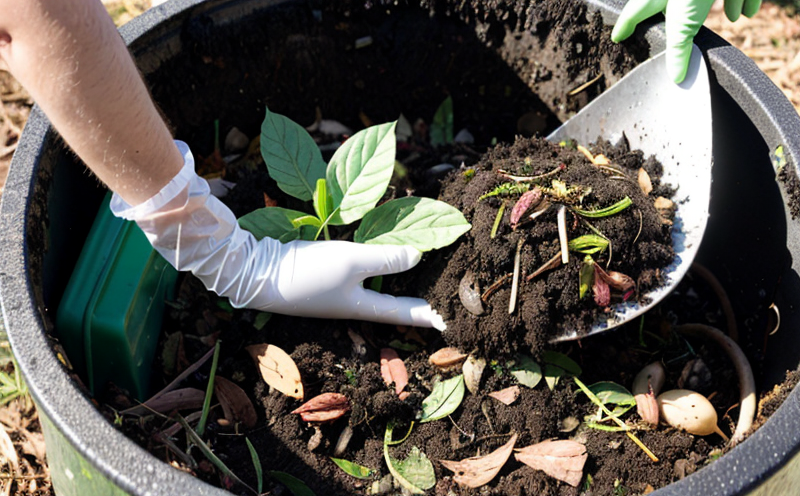ISO 11269 Soil and Compost Microbial Activity Testing
The ISO 11269 standard is a globally recognized method used to assess microbial activity in soils and compost. This testing procedure provides critical insights into the biological health of soil, which is essential for environmental sustainability and agricultural productivity. Understanding microbial activity helps ensure that waste management practices are optimized, leading to more effective recycling processes and improved nutrient availability.
The standard focuses on measuring microbial biomass and enzyme activity as indicators of soil health. These metrics reflect the viability and metabolic capabilities of microorganisms within a given sample. By quantifying these parameters, ISO 11269 helps identify potential issues such as contamination or insufficient microbial diversity, which could affect decomposition processes in composting facilities.
This testing method is particularly important for industries dealing with waste management and compost production because it ensures that the end products meet strict quality standards. Compliance with this standard can enhance brand reputation by demonstrating a commitment to environmental responsibility and regulatory adherence.
The process involves several key steps, including sample collection, preparation, incubation, and analysis using appropriate laboratory equipment such as spectrophotometers or fluorimeters for quantifying enzyme activity. Proper specimen preparation is crucial; it requires precise handling techniques to maintain the integrity of the microbial community during processing.
Accurate interpretation of results depends on understanding both quantitative measures like total viable count (TVC) and qualitative assessments based on enzymatic indicators. Results are typically reported in terms of units per gram or per kilogram, depending on the scale of analysis. Reporting should also include information about incubation conditions used during testing.
Compliance with ISO 11269 is beneficial not only for regulatory reasons but also because it supports sustainable practices by ensuring that compost materials are safe and effective for use in agriculture or landscaping applications. This standard plays a vital role in fostering trust among stakeholders involved in waste management and horticultural sectors.
Understanding the nuances of this testing process allows professionals to make informed decisions about product formulations, processing methods, and quality control measures. For instance, deviations from expected values may prompt further investigation into factors influencing microbial activity levels such as temperature fluctuations or nutrient availability.
In summary, ISO 11269 provides a robust framework for evaluating soil and compost microbial activity, offering valuable insights that contribute to better environmental stewardship across various industries.
Why It Matters
Implementing ISO 11269 in the context of waste management and compost production is essential due to its direct impact on ensuring product quality and compliance with international standards. Microbial activity testing helps maintain consistency in nutrient content, which enhances plant growth when used as soil amendments.
The ability to measure microbial biomass and enzyme activity provides critical data points that influence various aspects of the waste management lifecycle:
- Efficiency of decomposition processes
- Productivity in agricultural settings
- Safety for end-users
Achieving compliance with ISO 11269 demonstrates a company's dedication to maintaining high standards of environmental responsibility. This commitment translates into enhanced brand reputation and increased market confidence, especially among consumers who prioritize eco-friendly practices.
Industry Applications
| Application Area | Description |
|---|---|
| Waste Management Facilities | Ensure proper decomposition and recycling of organic waste into compost. |
| Agricultural Fertilizer Production | Evaluate the effectiveness of compost as a natural fertilizer source. |
| Horticulture | Determine the suitability of soil amendments for enhancing plant health and growth. |
These applications underscore how ISO 11269 supports sustainable practices within different sectors. By providing accurate measurements of microbial activity, this standard enables more precise management of resources and improved outcomes in environmental stewardship initiatives.
Use Cases and Application Examples
- Case Study 1: A municipal waste facility sought to improve the efficiency of its composting operation. By implementing ISO 11269, they were able to adjust their process parameters to optimize microbial activity, resulting in faster decomposition rates and higher quality compost.
- Case Study 2: An agricultural company aimed to develop a new line of organic fertilizers based on compost. Using ISO 11269 helped them ensure consistent nutrient levels across batches, thereby improving crop yields without compromising soil health.
In both instances, adherence to the ISO 11269 standard played a pivotal role in achieving desired outcomes. It provided a standardized approach that facilitated continuous improvement and ensured reliability of results across different environments.





